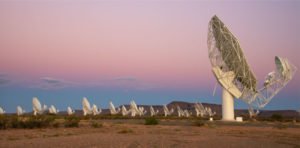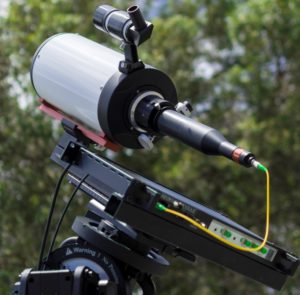Project area/S
- Engineering
Project Details
The distribution of high-precision reference signals from atomic clocks is necessary to synchronize large radio telescopes such as the Square Kilometre Array, and to perform high-precision ground-to-space measurements for General Relativity and other fundamental and applied physics applications.
The student will have the choice of two project themes.
 Theme 1 – synchronization of radio telescopes
Theme 1 – synchronization of radio telescopes
In this theme, the student will assist the Astrophotonics group in the prototyping of a system to transmit high-precision synchronization signals to the antennas of a large radio telescope, such as the SKA. The student will work on a combination of experimental optics in the laboratory, and programming of field-programmable gate arrays (FPGAs) to measure and control the synchronization signals.
 Theme 2 – ground-to-space laser links
Theme 2 – ground-to-space laser links
In this theme, the student will contribute to the development of technology for ground-to-satellite laser links for science and communication. The student can work on: computer vision and programming telescope mounts to track a target; active optics for suppression of atmospheric turbulence; or developing FPGA modules for control and analysis of high-precision laser systems.
Student Attributes
Academic Background
Undergraduate experimental physics and optics experience preferred. Electrical engineering topics including FPGA programming or digital communications an advantage.
Computing Skills
Python, C, or Linux experience preferred. Experience with a hardware description language (e.g. Verilog) an advantage.
Training Requirement
Optics laboratory practical skills and safety procedures. Programming in Python and/or other languages.
Project Timeline
- Week 1 Inductions and project introduction
- Week 2 Initial Presentation
- Week 3 Set up optics in laboratory for prototype testing
- Week 4 Begin developing code and control systems
- Week 5 Development and testing of code and control systems
- Week 6 Initial tests of code on lab prototype
- Week 7 Refinement and testing of code and prototype
- Week 8 Obtain final results and determine remaining work and next steps
- Week 9 Final Presentation
- Week 10 Final Report
